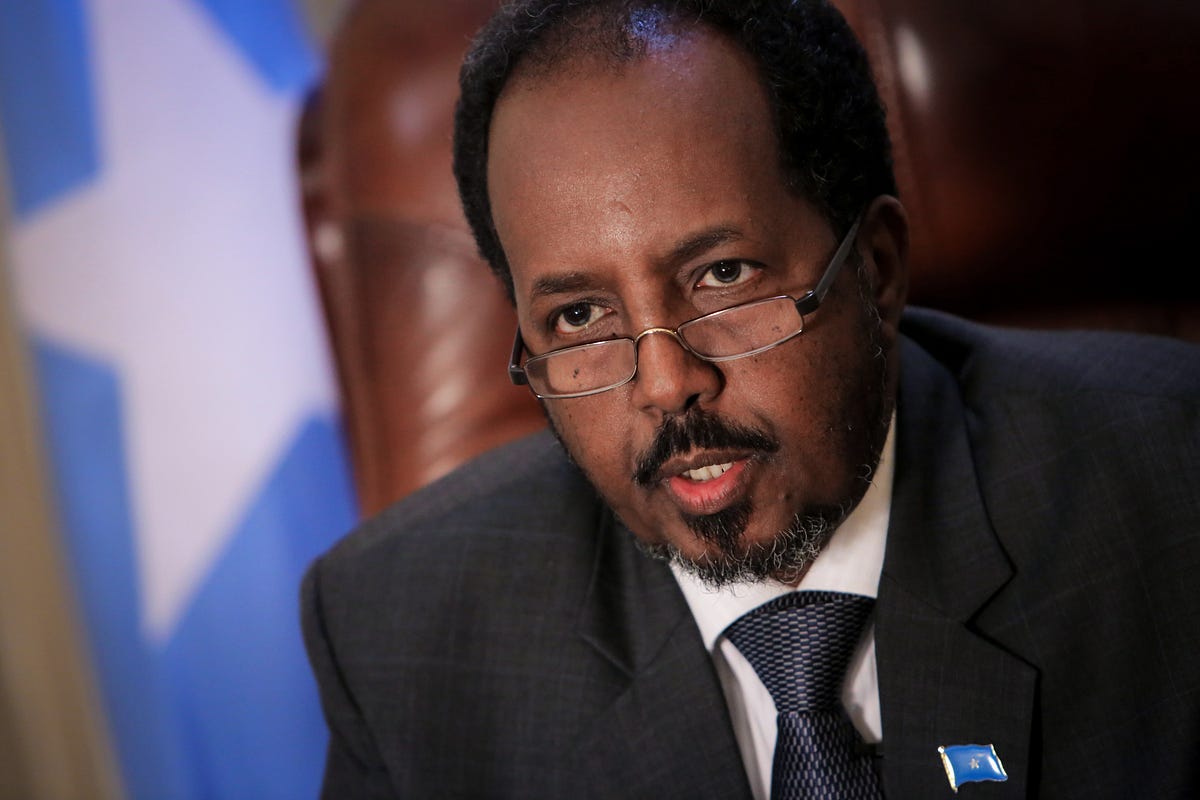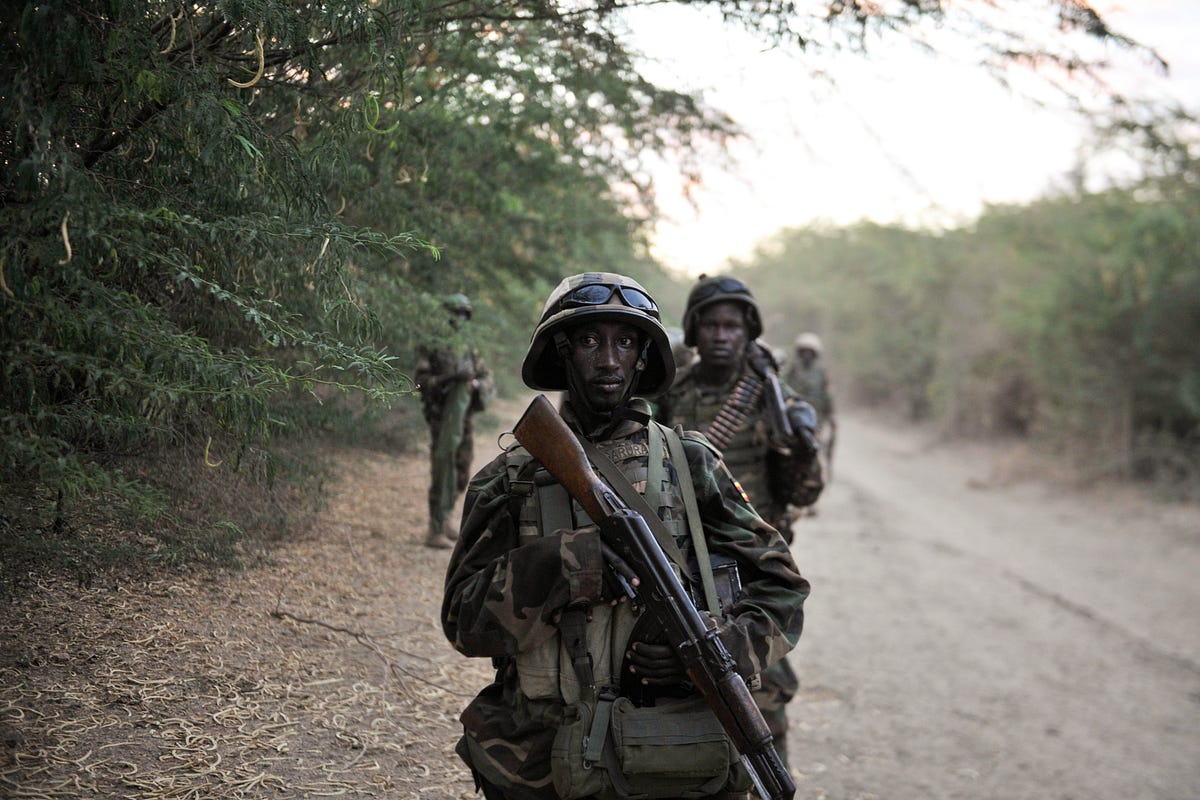Somalia is the archetypal failed state. A nation that has fractured so completely that for 20 years no central authority was able to control more than a few square kilometers of the capital.
For many outsiders, the word “Somalia” evoked images of Black Hawk Down, pirates and Islamist rebels stoning civilians found guilty of adultery. An attack on the Somali parliament that killed 18 people on May 24 only reinforced the stereotype of a country gone to Hell.
But there are reasons to hope for Somalia. A robust intervention by the African Union, manned mostly by Ugandan troops, improved security and helped protect the fledgling government starting in 2007.
A complex succession of interim governments produced a new constitution and a new president in 2012. Now Somalia stands at a crossroads. And while the future holds considerable promise, there are grave threats, as well.
 Somali president Hassan Sheikh Mohamud. U.N./Stuart Price photo
Somali president Hassan Sheikh Mohamud. U.N./Stuart Price photo
Great expectations
“Look at what Somalia is now” compared to a few years ago, says Andrews Atta-Asamoah, a senior researcher at the South African Institute for Security Studies. “It has come a long way.”
Somali and A.U. troops have pushed the Al Shabab Islamic militia out of the capital Mogadishu and many other strongholds. The Somali army and their allies today control larger parts of the country than at any point since the state collapsed into clan warfare in 1991.
But the real progress has been in the political realm, Andrews tells War is Boring. Especially notable was the inauguration of a new president and a new constitution in 2012.
The process was by no means democratic—president Hassan Sheikh Mohamud was elected by a parliament whose members had been appointed by clan elders, rather than by the general population. But it was the most inclusive political process the country had seen in a long time.
According to Atta-Asamoah, Mohamud also represented a “clean break with the past” and therefore brought to his office an unprecedented level of credibility.
In contrast to the interim governments that preceded him, Mohamud has no links to any of the country’s warlords or militias. A highly respected academic, he seems to stand above the fray of clan politics.
His installation met with considerable enthusiasm in the general population, although some of this has faded after two years. For many Somalis, security is the paramount political priority—and the Somali federal government has had a hard time capitalizing on its battlefield victories.
Insurgent attacks on the capital are common and burden the Mohamud administration with an image of powerlessness. Many Somalis criticize the president for spending a lot of time abroad attending international conferences and donor meetings.
Both issues are real, Atta-Asamoah says. But he proposes that Mohamud is caught in a classic “catch-22.”
“The international community has become another constituency,” for the president, Atta-Asamoah points out. Somalia utterly relies on the African Union and Western countries for soldiers and money. Donor countries are wary of investing in such an unstable regime as Mohamud’s. They need constant reassuring.
As for the security situation, the country might be safer had Mohamud not fired so many of Mogadishu’s experienced bureaucrats. On the other hand, retaining this institutional experience would have made it hard for Mohamud to maintain the image of an outsider, unsullied by the government’s past failures.
The balancing act is a delicate one—and one at which Mohamud occasionally fails. More than a hundred parliamentarians recently voted to impeach him.
 But the impeachment vote is actually a good thing, considering the alternative. Instead of taking up arms, the opposition “is looking at the constitution and trying to use legal processes,” Atta-Asamoah explains. “We have actually seen an improvement in the way that people deal with conflict in that sense. And I think that this is the only way forward in terms of rebuilding Somalia.”
But the impeachment vote is actually a good thing, considering the alternative. Instead of taking up arms, the opposition “is looking at the constitution and trying to use legal processes,” Atta-Asamoah explains. “We have actually seen an improvement in the way that people deal with conflict in that sense. And I think that this is the only way forward in terms of rebuilding Somalia.”
A.U. troops during a patrol. U.N./Tobin Jones photo
The federalism problem
Federalism is one of the most divisive issues. Too strong a central state could make it impossible to solve the root causes of conflict in Somalia’s clan-based society.
By contrast, federalism would allow the various clans to retain political control over affairs in their own territory, while ideally leaving just enough power with the central government to unite the country.
But the 2012 constitution is vague on the concrete form that federalism should take in Somalia—and deliberately so. The drafters felt that because the constitution wasn’t the product of a thoroughly democratic process, the specifics of this vital question should be decided later.
This shows commendable foresight, but also means headaches in the present day as competing powers sort out their relationships without the benefit of constitutional guidance.
Consider Jubaland, the southwest Somali region that borders Kenya and is dominated by its economic capital, Kismayo. Long an important stronghold of Al Shabab, Kismayo and the surrounding areas were liberated in September 2012 by a coalition of Kenyan troops and the local Ras Kamboni militia.
Control over Kismayo would have considerably boosted the federal government’s income, thanks to the city’s important harbor.
But Ras Kamboni leader Sheikh Ahmed Madobe had no intention of giving up his own claim on Kismayo’s tax income … and simply shut the Mohamud’s administration out of the city. Kenya in theory has a duty to support the federal government, but instead tacitly supports Madobe—because an independent Jubaland fits better with Kenya’s political agenda than a strong Somali central state does.
Somalia’s has a similarly conflicted relationship with its other large neighbor Ethiopia, owing to a long a history of conflict between the two countries. Still, Atta-Asamoah says he’s confident that Somalia’s neighbors play a largely positive role today. “I think that they are all interested in bringing about peace in Somalia, because the realization that the instability in Somalia is costing the region a great deal.”
 A.U. troops during a patrol. U.N./Tobin Jones photo
A.U. troops during a patrol. U.N./Tobin Jones photo
Al Shabab evolves
The biggest threat to Somalia’s fragile renaissance may not be politics, but the Islamist militia Al Shabab. While battlefield defeats have weakened Al Shabab and stripped it of its main strongholds, losses could actually force the militia to evolve into something far deadlier.
In the face of better equipped Kenyan, Ethiopian and Ugandan A.U. troops, Al Shabab has had no choice but to change its tactics. Instead of trying to hold or capture territory, Al Shabab now melts away at the first indication of serious resistance.
The militia allows A.U. and government troops to take control of cities and roads, then launches guerrilla attacks aimed at slowly demoralizing its enemies and turning the population against them.
After leaving a town, Atta-Asamoah explains, Al Shabab will try to cut it off from the surrounding countryside, attacking everybody that tries to enter it without considerable military protection. This leads to an increase in food prices and results in frustration among everyday people. Terror attacks against targets of opportunity and representatives of the federal government further undermine any progress.
Faced with this strategy, the A.U. mission is now at the limits of what it can achieve militarily. It has had to concentrate on securing the areas it has already liberated, instead of pushing Al Shabab out of new areas. Even if the A.U. and the Somali government succeed in completely denying Al Shabab a territorial base, it’s far from certain that this would mean the end of the group.
Al Shabab is looking more and more like the classic Al Qaeda, a group with which it maintains a formal alliance. It stages assassinations and suicide bombings in Mogadishu as well as in neighboring countries. There are no more moderates among its leadership. The group’s bosses have no interest in compromise and negotiation.
Al Shabab has fewer fighters, but those who are left are highly motivated and very capable specialists in asymmetric warfare.
The Somali government will need to invest heavily in security to win the trust of the general population. The fight for hearts and minds is becoming more important than battlefield victories.
Somalia’s future is at stake. “If some level of stability is achieved, then you will really see the country picking up economically and becoming a country that will create a huge economic impulse in the horn of Africa,” Atta-Asamoah says.
Decades of war have scattered the Somali people all across the globe, where they have formed successful communities that send millions of dollars back home in remittances every month. This kind of resourcefulness could mean a bright future for Somalia. But security and democracy must come first.
Peter Dörrie is a freelance journalist covering resources, security and politics in Africa. You can follow him on Twitter at @peterdoerrie. Medium has an app! Sign up for a daily War is Boring email update here.
No comments:
Post a Comment